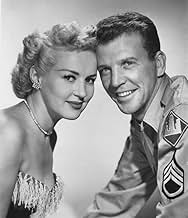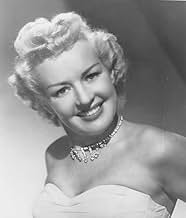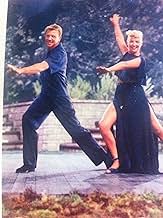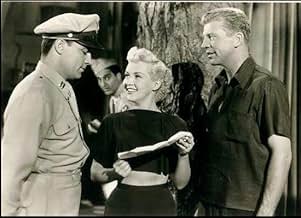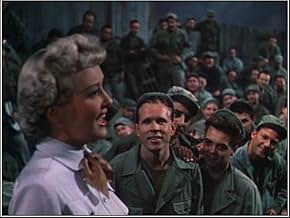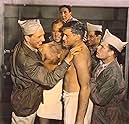CALIFICACIÓN DE IMDb
5.7/10
302
TU CALIFICACIÓN
Un soldado estadounidense en el Japón ocupado intenta reconquistar a su antiguo amor, quien está presentando un espectáculo para las tropas.Un soldado estadounidense en el Japón ocupado intenta reconquistar a su antiguo amor, quien está presentando un espectáculo para las tropas.Un soldado estadounidense en el Japón ocupado intenta reconquistar a su antiguo amor, quien está presentando un espectáculo para las tropas.
- Dirección
- Guionistas
- Elenco
- Premios
- 2 premios ganados en total
The Three Dunhills
- Speciality Act
- (as The Dunhills)
Yumin Akita
- Japanese Man
- (sin créditos)
Richard Allan
- Stewart
- (sin créditos)
Leon Alton
- Soldier
- (sin créditos)
Gordon Armitage
- Soldier
- (sin créditos)
Robert Bohannon
- Soldier
- (sin créditos)
Tommy Bond
- Little Soldier
- (sin créditos)
Opiniones destacadas
I've recently seen several Dan Dailey movies and while they are rather pleasant viewing, they also suffer from a certain sameness...way too much sameness. In at least four of his films (a few of which ALSO feature him with Betty Grable), he plays a song and dance man who is a terrible husband and whose wife is sick and tired of it. And, in all of them, by the time the film ends, he hasn't changed that much and yet there's some happily ever after. It is complete formula...and because of that, there's really no need to see them all.
The story begins just after V-J Day. Shep (Dan Dailey) is looking for his wife, Kay, as they were separated by the war...with him serving in the Army and her as well, but with a unit entertaining the troops. But she does NOT want Shep to follow her as their marriage is in shambles and she is planning on divorcing him. Oddly, however, she has never finalized the divorce...which only encourages Shep to keep pursuing her...which he does throughout the film.
This is pretty much the usual Twentieth Century-Fox production. The songs are mostly forgettable (though I liked the one set on a train) and the formula is something every audience knows by heart. So, if you've never seen one, you'll probably like this movie a lot more than I did. I just felt it was a case of 'been there...done that'.
By the way, the film did a lousy job showing what was supposed to be Tokyo circa September, 1945. The town was mostly leveled...burned to the ground by American bombers. But here, it looks just fine. The story also is supposedly set in Kyoto...which was spared the bombings and the film get this part right.
For someone who has seen too many such Dailey films...4. For someone not tired of the formula...6.
The story begins just after V-J Day. Shep (Dan Dailey) is looking for his wife, Kay, as they were separated by the war...with him serving in the Army and her as well, but with a unit entertaining the troops. But she does NOT want Shep to follow her as their marriage is in shambles and she is planning on divorcing him. Oddly, however, she has never finalized the divorce...which only encourages Shep to keep pursuing her...which he does throughout the film.
This is pretty much the usual Twentieth Century-Fox production. The songs are mostly forgettable (though I liked the one set on a train) and the formula is something every audience knows by heart. So, if you've never seen one, you'll probably like this movie a lot more than I did. I just felt it was a case of 'been there...done that'.
By the way, the film did a lousy job showing what was supposed to be Tokyo circa September, 1945. The town was mostly leveled...burned to the ground by American bombers. But here, it looks just fine. The story also is supposedly set in Kyoto...which was spared the bombings and the film get this part right.
For someone who has seen too many such Dailey films...4. For someone not tired of the formula...6.
There was not much you could do with Call Me Mister after 20th Century Fox bought the rights. Unless of course you wanted to do a review like Ziegfeld Follies. So the title is retained and a few songs and a story is written. Of course when you have Betty Grable doing her fourth and last film with Dan Dailey that usually sold any film that Fox put out.
Harold Rome wrote the score for the Broadway revue Call Me Mister. The theme was about the end of World War II and the return to civilian life for the troops. The songs and sketches reflected that. The very topicality of the show is the reason it's not revived today. The plot here concerns the end of the war. Betty Grable is a WAC and her estranged husband are both in occupied Japan. They were a double act in vaudeville, she's looking to put on a GI show. He's looking to get the title of civilian again.
But Dailey who arrives at base a little late finds his ship has sailed for the USA and discharge. So he fakes some orders and gets himself assigned to Grable's show. Where he has to deal with Captain Dale Robertson to win back his wife.
Let's say it helps that Dailey sings and dances in his quest. And through some typical army red tape his potential jackpot disappears.
Danny Thomas is in the cast also and he gets one of the Rome retained songs Military Life. Bobby Short also is lead singer with Going Home Train also retained from the original.
I can't understand myself why the biggest hit of the show South America Take It Away didn't make the film. It sold a lot of records for Bing Crosby and the Andrews Sisters. As the film itself was about putting on a show it could have been worked in easily enough. It's heard in passing briefly.
One song I always liked was The Shiny New Face On The Dime in tribute to Franklin D. Roosevelt. In 1946 with FDR's death still fresh it was a poignant show stopper. I guess that Darryl Zanuck felt it wouldn't have the same impact in 1951. A pity, it's a great song.
In small roles at the start of their careers are Richard Boone and Jeffrey Hunter both Fox contract players. Benay Venuta is Grable's girl sidekick and she and Thomas pair off well.
For fans of any of the cast members in this still amusing and entertaining musical.
Harold Rome wrote the score for the Broadway revue Call Me Mister. The theme was about the end of World War II and the return to civilian life for the troops. The songs and sketches reflected that. The very topicality of the show is the reason it's not revived today. The plot here concerns the end of the war. Betty Grable is a WAC and her estranged husband are both in occupied Japan. They were a double act in vaudeville, she's looking to put on a GI show. He's looking to get the title of civilian again.
But Dailey who arrives at base a little late finds his ship has sailed for the USA and discharge. So he fakes some orders and gets himself assigned to Grable's show. Where he has to deal with Captain Dale Robertson to win back his wife.
Let's say it helps that Dailey sings and dances in his quest. And through some typical army red tape his potential jackpot disappears.
Danny Thomas is in the cast also and he gets one of the Rome retained songs Military Life. Bobby Short also is lead singer with Going Home Train also retained from the original.
I can't understand myself why the biggest hit of the show South America Take It Away didn't make the film. It sold a lot of records for Bing Crosby and the Andrews Sisters. As the film itself was about putting on a show it could have been worked in easily enough. It's heard in passing briefly.
One song I always liked was The Shiny New Face On The Dime in tribute to Franklin D. Roosevelt. In 1946 with FDR's death still fresh it was a poignant show stopper. I guess that Darryl Zanuck felt it wouldn't have the same impact in 1951. A pity, it's a great song.
In small roles at the start of their careers are Richard Boone and Jeffrey Hunter both Fox contract players. Benay Venuta is Grable's girl sidekick and she and Thomas pair off well.
For fans of any of the cast members in this still amusing and entertaining musical.
This was just about the last of the "putting on a show" musicals and even in 1951 it probably had rather an old fashioned look about it. It's nothing special, the music and sets are rather uninspired and the humor is dated but Betty Grable and Dan Dailey make a pleasant couple. Apparently they liked working together and it comes across in their dance numbers.
Highlights are Grable and Dailey's love duet and Bobby Short in the "Going Home Train" number.
Nice, nostalgic way to spend 90 minutes and the Grable legs have lost none of their lustre.
Highlights are Grable and Dailey's love duet and Bobby Short in the "Going Home Train" number.
Nice, nostalgic way to spend 90 minutes and the Grable legs have lost none of their lustre.
LLoyd Bacon, the director of "Call me Mister", had an excellent track record as the man that gave us "42 Street", "Gold Diggers of 1936", "The Frisco Kid", and "Brother Orchid", among others. The film is based in a musical review with music by Harold Rome and Arnold Auerbach.
The plot is a vehicle to show Betty Grable in a musical about a USO performer in post war Japan. The story is just a pretext to present Ms. Grable as an entertainer who wants to share joy among the troops still awaiting repatriation. Ms. Grable had such an effervescence about herself, it's easy to fall under her spell even in such a silly comedy as this one.
Dan Dailey plays the man in Ms. Grable's life. He was an excellent singer and dancer who always projected a masculine presence in anything he did. Both Ms. Grable and Mr. Dailey make a winning combination in the movie.
We get to see other faces that went to make names for themselves. Dale Robertson, Danny Thomas, Richard Boone, Jeffrey Hunter, Frank Fontaine, Jerry Paris and Bobby Short, among others.
The musical numbers were staged by Busby Berkley, a man who always had an edge in everything he did. The last production number stands out as the four principals, Ms. Grable, Mr. Dailey, Ms. Venata and Mr. Thomas take to the stage.
That was entertainment!
The plot is a vehicle to show Betty Grable in a musical about a USO performer in post war Japan. The story is just a pretext to present Ms. Grable as an entertainer who wants to share joy among the troops still awaiting repatriation. Ms. Grable had such an effervescence about herself, it's easy to fall under her spell even in such a silly comedy as this one.
Dan Dailey plays the man in Ms. Grable's life. He was an excellent singer and dancer who always projected a masculine presence in anything he did. Both Ms. Grable and Mr. Dailey make a winning combination in the movie.
We get to see other faces that went to make names for themselves. Dale Robertson, Danny Thomas, Richard Boone, Jeffrey Hunter, Frank Fontaine, Jerry Paris and Bobby Short, among others.
The musical numbers were staged by Busby Berkley, a man who always had an edge in everything he did. The last production number stands out as the four principals, Ms. Grable, Mr. Dailey, Ms. Venata and Mr. Thomas take to the stage.
That was entertainment!
What a shame. They just never seemed to know what to do with Betty Grable. She gets these terrible films to star in, which she can't possibly save.
In this effort, we are at the very end of WW2 and it's the usual 'let's-put-on-a-show' type of musical storyline set against the backdrop of whether or not Betty Grable (Kay) will get back together romantically with fellow performer and soldier Dan Dailey (Shep). There are two other potential suitors on hand - captain Dale Robertson (Johnny) and pot-washer Danny Thomas (Stanley). We know that there is only ever going to be one winner so there is no drama with this storyline.
As for the cast, we get some terrible set pieces, especially the end performances. Also, how can we spend so much time with Thomas and his painful monologues? They are NOT FUNNY. Ever. How could the film's producers not catch on to this? The film scores points for Grable dancing, a couple of songs at the beginning, The Three Dunhills speciality dancing act and Technicolour.
There is nothing going on here whenever Grable is off screen. It's a tedious film that limps to an anti-climax of an ending.
In this effort, we are at the very end of WW2 and it's the usual 'let's-put-on-a-show' type of musical storyline set against the backdrop of whether or not Betty Grable (Kay) will get back together romantically with fellow performer and soldier Dan Dailey (Shep). There are two other potential suitors on hand - captain Dale Robertson (Johnny) and pot-washer Danny Thomas (Stanley). We know that there is only ever going to be one winner so there is no drama with this storyline.
As for the cast, we get some terrible set pieces, especially the end performances. Also, how can we spend so much time with Thomas and his painful monologues? They are NOT FUNNY. Ever. How could the film's producers not catch on to this? The film scores points for Grable dancing, a couple of songs at the beginning, The Three Dunhills speciality dancing act and Technicolour.
There is nothing going on here whenever Grable is off screen. It's a tedious film that limps to an anti-climax of an ending.
¿Sabías que…?
- TriviaIn this musical, director Lloyd Bacon and dance director Busby Berkeley worked together for the first time since La calle 42 (1933).
- ErroresShep Dooley hops a ride on a rickshaw to reach his military base and passes a stonewall flower garden. Several hours and a very tired rickshaw runner later, he reaches his destination, and we pass the very same flower garden.
- Citas
Kay Hudson: Well, captain, I'll be brief.
Capt.Johnny Comstock: Oh, please don't.
Selecciones populares
Inicia sesión para calificar y agrega a la lista de videos para obtener recomendaciones personalizadas
Detalles
- Fecha de lanzamiento
- País de origen
- Idioma
- También se conoce como
- Call Me Mister
- Locaciones de filmación
- Productora
- Ver más créditos de la compañía en IMDbPro
Taquilla
- Presupuesto
- USD 1,900,000 (estimado)
- Tiempo de ejecución1 hora 36 minutos
- Relación de aspecto
- 1.37 : 1
Contribuir a esta página
Sugiere una edición o agrega el contenido que falta


